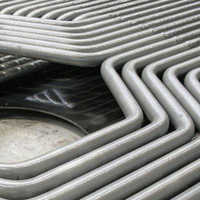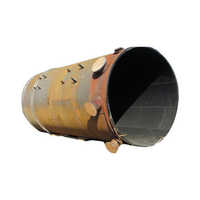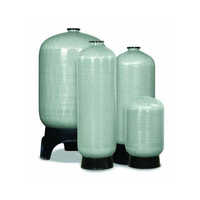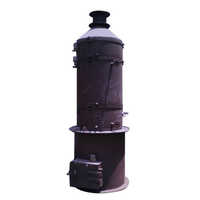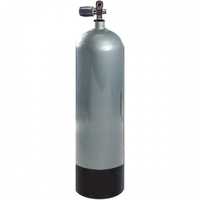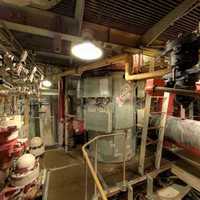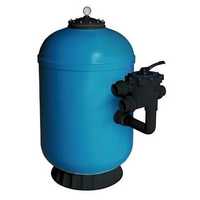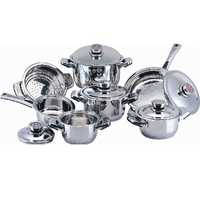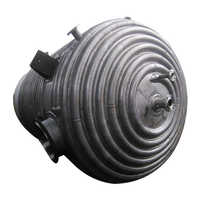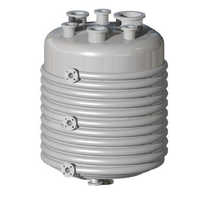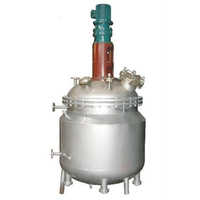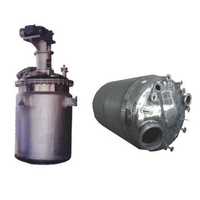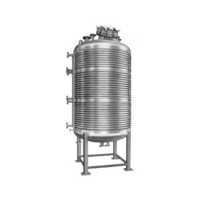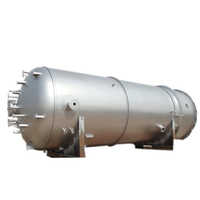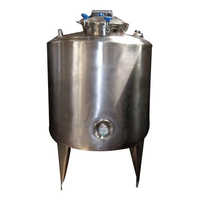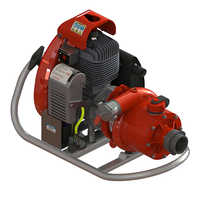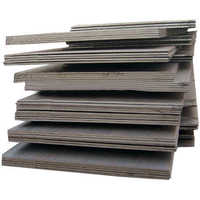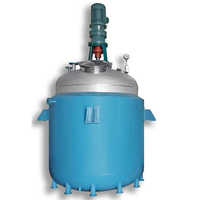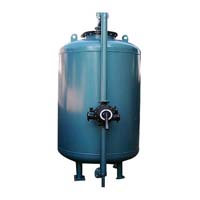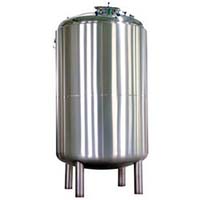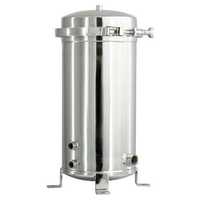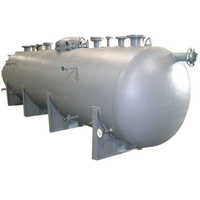Pressure Vessels
(4173 products)
Pressure Vessels are containers designed to contain gases or liquids at pressures different from the surrounding environment. They are commonly employed in various industries, including water treatment, chemical processing, and energy storage. These vessels are typically made from durable materials like stainless steel and are designed to withstand high pressures and temperatures. Their uses range from storing liquids in large quantities to maintaining specific pressure levels for extended periods.
...show morePressure vessels are containers designed to hold gases or liquids at a pressure substantially different from the ambient pressure.
There are many different types of pressure vessels, including storage vessels, process vessels, and heat exchangers.
Pressure vessels must be designed and operated to ensure that they are safe. This includes considering the pressure, temperature, and the materials of construction.
Pressure vessels are used in a wide variety of industries, including the chemical, petroleum, and food processing industries.
Pressure vessels offer a number of benefits, including the ability to store large volumes of gas or liquid, the ability to control the pressure and temperature of the contents, and the ability to protect the contents from contamination.
Related Categories
Abrasives
Acoustic Products
Acrylic Sheets
Air Blowers
Air Compressors & Air Separation Plants
Air Cooler
Air Dryers
Air Receiver
Air Valves
Aluminum Castings
Anchors
Anti Vibration Mounts
Ball & Roller Bearings
Ball Valves
Ballast Making Machines
Bearing Parts & Components
Bearings
Bellows & Expansion Joints
Belt Pulleys
Boilers, Components & Spares
Bolts
Bright Bars
Bristles
Burners/Industrial Burners & Incinerators
Bushings & Bushing Parts
Butterfly Valves
CNC Machined Components
Cable Pulleys
Capital Goods
Carbon & Graphite Products
Castor Wheels
Centrifugal Pumps
Centrifuges
Ceramics
Chains & Chain Link Fence Fittings
Cleaning Equipment
Clips, Clamps
Coils
Combustion Equipment
Compression Springs
Compressors & Allied Equipment
Control Valves
Conveyor & Conveyor/Industrial Belts
Cooling Tower & Chilling Plants
Corrosion Protection Materials
Coupling
Cranes
Cryogenic Equipment
Cutting Tools, Broaches & Cutters
Departmental Shelving
Diaphragm Valves
Die Castings
Dies & Moulds
Dies,Jigs,Fixtures
Diesel Engine & Electric Locomotive Spares
Draught Fan
EOT Cranes
Electric Hoists
Electric Motors & Engines
Electroplating Chemicals & Equipment
Elevators, Lifts & Escalators
Energy Management System
Engine Valves
Engineering Goods & Equipment
Engineering Plastics
Engraving Equipment
Extruded Profiles
Fasteners
Fiberglass Products
Filter Cartridges & Media
Filter Cloth, Filter Industrial
Filters-Air, Gas, Liquid
Filtration & Sedimentation Units
Flat Metal Processing Equipment
Float Valves
Fork Lift Truck Parts
Fork Lift Trucks
Forklifts
Foundry Raw Material & Equipment
Furnace Manufacturers
Galvanized Fasteners
Gantry Cranes
Gaskets
Gate Valves
Gauges & Gauge Glasses
Gear Boxes, Reduction Gears & Gear Cutting
Girder Cranes
Glass & Glass Products
Glass Cutting Tools/Glass Cutters
Globe Valves
Goliath Cranes
Grating
Hand & Allied Tools
Hand Pump
Hardware & Tools
Heat Exchangers
Heating Elements
Hex Bolts
Hex Nuts
Hooks & Mounts
Hoses
Hot Air Oven
Humidification & Ventilation Equipment
Hydraulic Hoses & Flexible Metal
Hydraulic Press
Hydraulic Press Brakes
Hydraulic Products & Equipment
Hydraulic Valves
Induction Heating Equipment
Industrial Automation
Industrial Brakes
Industrial Brushes
Industrial Clothing
Industrial Clutches
Industrial Cylinders
Industrial Dryers
Industrial Evaporators
Industrial Knives
Industrial Nets
Industrial Ovens
Industrial Rollers
Industrial Supplies Stocks
Industrial Supplies-General
Industrial Tape
Industrial Tools
Industrial Valves
Industrial Vibrator
Inspection Equipment
Instrumentation
Internal Combustion Engine
Jib Cranes
Laboratory Furniture
Laboratory Glassware & Equipment
Laundry Equipment
Lined Valves
Machine Tools Accessories
Marking Systems
Material Handling Equipment
Measuring Tools & Equipment
Mechanical Seals
Metallised Capacitor Films
Mining Equipment
Mining, Exploration & Drilling Machinery
Model Making Materials
Motor Couplings
Moulded Components
Moulds
Needle Valves
Needles
Nuts
Oil Seals
Outdoor Cooling Systems
Overhead Cranes
PVC Hoses
PVC Products
Paint Brushes
Painting Equipments & Maintenance
Perforated Sheets
Plastic Processing Machinery Parts
Plastic Valves
Plastic Welding Equipment
Plate Valves
Plug Valves
Pneumatic Products & Tools
Pneumatic Valves
Polish & Polishing Material/Machinery
Power Press
Precision Brass Components
Pressed Components
Pressure Gauges
Pressure Vessels
Pulleys
Pulverizers
Pump Spares Parts
Pumps & Pumping Equipment
Radiators
Refrigeration & Equipment
Rope Pulleys
Rope,Twines & Webbings
Ropes
Rotary Valves
Rubber & Rubber Products
Rubber Gaskets
Rubber Roller
Rubber Seals
Rubber Transmission Belts
Screws
Seals
Sensors & Transducers
Shaft Couplings
Shafts & Shaft Collars
Sheet Metal Components & Parts
Solenoid Valves
Springs
Stainless Steel Bolts
Stainless Steel Fasteners
Stainless Steel Nuts
Stainless Steel Valves
Storage Systems
Storage Tanks
Submersible Pumps
Surface Finishing Equipment
Synthetic Industrial Diamonds
Testing & Measuring Equipment
Thermostatic Bimetals & Thermostats
Trolleys & Carts
Tungsten Carbide
Ultrasonic Equipment
V-Belts
Vacuum Equipment & System
Valves
Valves Fittings
Vibrating Screen
Washers
Water Coolers
Weighbridge
Welding & Soldering Supplies
Welding Electrodes
Welding Equipment
Winches
Wire Drawing Dies
Wire Rope Hoists
Wire Ropes
Explore More Categories
Hydrogenation Reactor
Price: 200000.00 INR (Approx.)/Unit
MOQ - 1 Unit/Units
22 Years
Business Type: Manufacturer | Supplier
DIPESH ENGINEERING WORKS
Mild Steel Pressure Vessel Application: Air Purification
Price: 40000 INR (Approx.)/Unit
MOQ - 1 Unit/Units
Product Type - Pressure Vessel
Material - Mild Steel
Type - Cylindrical
8 Years
Business Type: Manufacturer | Supplier
AIRRO ENGINEERING CO.
Industrial Pressure Vessels
Price: 1000000 INR (Approx.)/Piece
MOQ - 1 Piece/Pieces
16 Years
Business Type: Manufacturer | Supplier
ASCENT MACHINERIES & ENGG. SERVICES
Industrial Pressure Vessels Capacity: 1000-10000 Liter/Day
Price: 25000.00 INR (Approx.)/Piece
MOQ - 1 Piece/Pieces
Color - Grey
Size - All size Available
Application - Industrial
6 Years
Response Rate: 91.18%
Business Type: Manufacturer | Distributor
INDOINFY STEELCORP
Indian Inquiries Only
Stainless Steel Pressure Vessels Usage: Industrial
Price Trend: 100000.00 - 1000000.00 INR (Approx.)/Unit
MOQ - 1 Unit/Units
Usage - Industrial
Product Type - Stainless Steel Pressure Vessels
Material - Stainless Steel
15 Years
Business Type: Manufacturer | Distributor
PRIME ADVANCE POLISHING SYSTEM PVT. LTD.
Pressure Vessel Capacity: 1000-10000L Liter/Day
Price Trend: 105000.00 - 300000.00 INR (Approx.)/Piece
MOQ - 1 Piece/Pieces
Color - Red
Product Type - Pressure Vessel
Usage - Industrial
4 Years
Business Type: Manufacturer | Supplier
CHARMI ENGINEERING
Industrial Flash Steam Separators
Price Trend: 3000.00 - 15000.00 INR (Approx.)/Piece
MOQ - 50 Piece/Pieces
6 Years
Business Type: Manufacturer | Supplier
MAHAVAS PRECISION CONTROLS PRIVATE LIMITED
Silver Industrial Pressure Vessel
MOQ - 1 Unit/Units
Product Type - Industrial Pressure Vessel
Size - Standard
Application - Gas, nitrogen, oxygen, chemical, etc.
1 Years
Business Type: Manufacturer | Distributor
DELPRO EQUIPMENTS PRIVATE LIMITED
Verified Exporter
( Accepts only Foreign Inquiry)
Blue Saturation Vessel
Price: 400000 INR (Approx.)/Unit
MOQ - 1 Unit/Units
Color - Blue
Product Type - Saturation Vessel
Filter Type - Cartridge
14 Years
Business Type: Manufacturer | Exporter
K-PACK SYSTEMS PRIVATE LIMITED
Pressure Vessels
Price: 25000 INR (Approx.)/Unit
MOQ - 1 Unit/Units
15 Years
Business Type: Manufacturer | Supplier
P-SQUARE TECHNOLOGIES
Grey Ss Vertical Pressure Vessels
Price: 1000000 INR (Approx.)/Unit
MOQ - 1 Unit/Units
Size - Different available
Color - Grey
Product Type - SS Vertical Pressure Vessels
2 Years
Business Type: Manufacturer | Supplier
UNITED ENGINEERS & CONSULTANTS
Sliver Reactor Vessel
Price Trend: 500000.00 - 5000000.00 INR (Approx.)/Unit
MOQ - 1 Unit/Units
Product Type - Reactor Vessel
Usage - industrial
Color - Sliver
13 Years
Business Type: Manufacturer | Exporter
PRATHAM ENGINEERING
Jacketed Tank
Price: 240000.00 INR (Approx.)/Unit
MOQ - 1 Unit/Units
Product Type - Jacketed Tank
Material - SS
Capacity - 500-1500 Litre
11 Years
Business Type: Manufacturer | Exporter
VED ENGINEERING
Frp Pressure Vessel Application: Filtration
Price Trend: 40000.00 - 200000.00 INR (Approx.)/Number
MOQ - 1 Number
Usage - water treatement
Color - blue,green netural, grey
Application - filtration, RO plant
4 Years
Business Type: Manufacturer | Exporter
SHALIN COMPOSITES (INDIA) PRIVATE LIMITED
White Cryogenic Pressure Vessels
Price: 21,00,000 INR (Approx.)/Unit
MOQ - 1 Unit/Units
Size - 1000 L
Usage - Industrial
Color - White
Business Type: Trading Company
Abhijit Enterprises
Low Pressure Ammonia Receivers
Price: 800000 INR (Approx.)/Piece
MOQ - 1 Piece/Pieces
13 Years
Business Type: Manufacturer | Supplier
METALEX CRYOGENICS LTD.
Stainless Steel Pressure Vessels Size: Customized
Price: 300000 INR (Approx.)/Unit
MOQ - 5 Unit/Units
Usage - Industrial
Product Type - Stainless Steel Pressure Vessels
Size - Customized
1 Years
Business Type: Manufacturer | Distributor
MSM PROCESS SOLUTIONS PVT. LTD.
Indian Inquiries Only
Stainless Steel Chemical Reactor Vessel Application: Industrial
Price: 600000 INR (Approx.)/Unit
MOQ - 1 Unit/Units
Color - Silver
Size - Different Available
Product Type - Stainless Steel Chemical Reactor Vessel
Business Type: Manufacturer | Supplier
Ambika Process Equipments
Stainless Steel Industrial Reaction Vessels
MOQ - 10 Unit/Units
Size - Different Sizes Available
Usage - Industrial
Material - Stainless Steel
2 Years
Business Type: Manufacturer | Exporter
ROTECH ENGINEERS
Pressure Vessel Application: These Are Utilized For Processing Of Liquids
MOQ - 1 Unit/Units
Color - As per Project Requirement
Usage - These are utilized for processing of liquids, gases or vapour at different levels of Temperatures & pressures in varied Industries.
Size - As per Design Specification
9 Years
Business Type: Manufacturer | Exporter
SHREE SARJAN INDUSTRIES PVT. LTD.
Seamless Finish Industrial Pressure Vessel
MOQ - 5 Piece/Pieces
6 Years
Business Type: Manufacturer | Distributor
YANTRIK ENGINEERS
Stainless Steel Pressure Vessel
Price: 200000 INR (Approx.)/Unit
MOQ - 10 Unit/Units
Surface Treatment - Galvanized
Material - Stainless Steel
Connecting Type - Welding
2 Years
Business Type: Manufacturer | Exporter
BHAVYA INDUSTRIES
Pressure Vessels Manufacturers | Suppliers in India
| Company Name | Location | Member Since |
|---|---|---|
| Dipesh Engineering Works | Mumbai, India | 22 Years |
| Ascent Machineries & Engg. Services | Mumbai, India | 16 Years |
| Prime Advance Polishing System Pvt. Ltd. | Vadodara, India | 15 Years |
| P-Square Technologies | Pune, India | 15 Years |
| K-Pack Systems Private Limited | Bengaluru, India | 14 Years |
| Utech Projects Pvt. Ltd. | Mumbai, India | 13 Years |
| Pratham Engineering | Mira Bhayandar, India | 13 Years |
| Metalex Cryogenics Ltd. | Pune, India | 13 Years |
| Ved Engineering | Noida, India | 11 Years |
| Jd Engineering | Ghaziabad, India | 10 Years |
Pressure Vessel: Introduction
It is necessary to apply pressure to a container in order to store liquids, vapors, or gases at pressures significantly higher or lower than the surrounding atmosphere. They are used in a wide variety of fields, from the petrochemical industry to the oil and gas business to the chemical industry to the food processing industry. Machines like reactors, flash drums, separators, and heat exchangers all make use of pressure vessels.
There is a codified set of rules and regulations that cover every aspect of pressure vessels. The Boiler and Pressure Vessel Code (BPVC) is the most frequently used and acknowledged collection of guidelines for boilers, pressure vessels, and nuclear power plant components.
Pressure Vessel: How Does It Work?
In order for a pressure vessel to perform its intended purpose, it must first achieve the necessary level of pressure for the task at hand similar to how a diving tank must maintain its air pressure. Either directly, through the use of valves and release gauges, or indirectly, through the transfer of heat, they can deliver the pressure.
Temperatures typically exceed 750 degrees Fahrenheit (400 degrees Celsius), and potential pressure levels range anywhere from 15 psi to to 150,000 psi. There is a wide range of capacities available for pressure tanks, ranging from 75 litres (about 20 gallons) to several thousand litres.
Pressure Vessels: Uses, Types
Different types of Pressure Vessels and Their uses
1. Storage Vessels
These are pressure containers that are used to keep liquids, vapours, and gases for a temporary period of time. The container may be put to use later on in a subsequent process to hold fluids, or it may be used to store finished goods like compressed natural gas (CNG) and liquid nitrogen.
3. Packed bed reactor
Cylindrical containers known as packed bed reactors house an immobilised bed of catalyst inside their interior. The reaction occurs on the surface of the solid catalyst as the gaseous or liquid reactants flow out of the vessel in one direction.
The conversion rate of packed bed reactors is high relative to the amount of catalyst used, and there is a greater surface area of contact between the reactant and the catalyst.
Having said that, the cylindrical vessel that houses these reactors needs to be strong enough to withstand the weight of the catalyst bed.
4. Jacked reactors
During a chemical reaction, it is important to keep the temperature of the Pressure Vessels, products, and catalysts at the same level. The contents of the reactor can be cooled or heated by a utility fluid that circulates through the jacket that wraps around the vessel. Examples of such fluids include cooling water and steam.
When designing reactors, one of the most important factors to take into account is the type of the reaction. During a chemical reaction, heat can either be given off referred to as an exothermic reaction or taken in referred to as an endothermic reaction .
It is necessary to either heat or cool the mixture during the reaction in order to create conditions that are favourable for the reaction, which will maximise product conversion and increase efficiency. Additionally, this will help prevent an uncontrolled increase or decrease in temperature during the reaction. Therefore, a reactor with a jacket is something that needs to be considered.
5. Fluidized bed reactor
Additionally, it includes a bed of the catalyst. The solid catalyst is kept in suspension inside the reactor pressure vessel by the high velocities at which the gaseous or liquid reactants move across the bed in these reactors.
This causes the solid catalyst to operate more like a fluid. Because the catalyst is fluidized, it is possible to thoroughly mix the reactants in all directions. As a result, it is possible to achieve high reactant conversion and mass transfer rates as well as a temperature that is uniform throughout the reactor.
6. Spherical pressure vessels
Due to the robust structure of spherical pressure vessels, they are ideally suited for the containment of high-pressure fluids; yet, the fabrication of these vessels is complicated and expensive. Because both the internal and external load are distributed uniformly around the surface of the sphere, there are no weak places in the structure.
They have a lower surface area to volume ratio than the other options. If a pressure vessel of the same volume is going to be manufactured, then fabricating a spherical vessel will require a smaller amount of material than fabricating a cylindrical vessel. Because of its smaller surface area, the spherical vessel will experience a lower rate of heat transfer from the more intensely heated body in comparison to other shapes.
7. Cylindrical Pressure Vessels
A cylindrical shell and a set of heads are the component parts that make up a cylindrical pressure vessel. The body of the pressure vessel is represented by the cylindrical shell. The heads act as end caps or an enclosure for the shell, covering the contents of the vessel that they are attached to.
The heads can have a more rounder or flatter contour, depending on your preference. This latter minimises the cylindrical vessel's susceptibility to damage.Because of their adaptability and space efficiency, cylindrical pressure vessels are the most common type of vessel.
They can be manufactured at a far lower cost than spherical vessels can. However, in comparison to spherical pressure vessels, they tend to have a lower strength. In order to obtain the same level of strength as spherical vessels when bearing the same level of internal pressure, their walls often need to be thicker.
8. Boilers
A boiler is a type of heat transfer equipment that can draw its heat from a fuel source, a nuclear power source, or an electrical power source. Boilers are used in a variety of industries, including the chemical, nuclear, and electrical power industries.
The majority of the time, they assume the shape of an enclosed vessel that performs the function of a conduit, allowing heat to travel from the source of heat to the fluid that is being heated.The heating of liquids is the primary function of these various devices.
The fluid's phase will regularly transition from the liquid state, in which it is currently found, to the vapour state, in which it is currently found, inside the boiler. In addition to being used in the generation of electricity, the vapour that is created by the boiler is also put to use in a range of other applications that include heating.
The turbine blades are given a boost in speed by the pressurised steam that is generated by steam boilers. This steam is produced at a higher pressure than is typical. Because of this, the vessel that makes up the boiler needs to have a high degree of strength in order to be able to endure the extremely high pressures and levels of thermal stress that it will be subjected to.
The majority of different kinds of substances experience a weakening of their level of strength as the temperature is raised.
9. Heat Exchangers
Heat exchangers are devices that are used to move heat from one fluid to another or between multiple fluids. They find widespread application in the energy, food processing, bioprocessing industries and pharmaceutical, among others.
The functionality of heat exchanger equipment is reliant on the thermal and flow properties of the fluids that are participating in the heat exchange, as well as the thermal property of the conductive partition for indirect contact heat exchangers.
The difference in temperature between the hot and cold fluids in a heat exchanger causes the materials in the device to be subjected to stress, as does the internal pressure of the device, which contains the fluids.
10. Process Vessels
These vessels are a second subcategory that can be derived from pressure vessels. In commercial environments, these containers are used for a wide variety of processes, including mixing, agitation, decanting, distilling, mass separating, and chemical reactions.
The degree to which there will be a change in pressure inside the process vessel is determined by the process itself as well as the substances that are being changed.
11. Columns for Distillation
As a consequence of this, a mixture of liquids can be sorted into groups according to the particular degrees of volatility that they possess.
Vapours, and Storage and transport of liquids, gases at pressures much greater or lower than ambient pressure requires the use of pressure vessels. Some rules govern the design, building, repair, and testing of pressure vessels; examples are the ASME BPVC and API 510. Safety during operation of the pressure vessel is prioritised during the creation of such rules.
Heat exchangers, boilers, Storage tanks, and process vessels are the various types of pressure vessels. You can find both spherical and cylindrical pressure vessels. In most cases, vessels will be cylindrical in shape, but their tops may be hemispherical, ellipsoidal, or toroidal. A pressure vessel's axis might be either vertical or horizontal.
FAQ: Pressure Vessels
Q. What are pressure vessels used for?
Ans. Pressure vessels designed to maintain a pressure much higher or lower than that of the surrounding environment, in order to store or transport gases or liquids.
Q. What is a reaction vessel used for?
Ans. Reaction vessel is used for holding the components of a reaction.
Q. What is difference between vessel and reactor?
Ans. A vessel is a container for the steam or gases that power a turbine to generate energy, whereas a reactor is the Engine that generates the steam or hot gases.
Related Categories
Related Categories
Abrasives
Acoustic Products
Acrylic Sheets
Air Blowers
Air Compressors & Air Separation Plants
Air Cooler
Air Dryers
Air Receiver
Air Valves
Aluminum Castings
Anchors
Anti Vibration Mounts
Ball & Roller Bearings
Ball Valves
Ballast Making Machines
Bearing Parts & Components
Bearings
Bellows & Expansion Joints
Belt Pulleys
Boilers, Components & Spares
Bolts
Bright Bars
Bristles
Burners/Industrial Burners & Incinerators
Bushings & Bushing Parts
Butterfly Valves
CNC Machined Components
Cable Pulleys
Capital Goods
Carbon & Graphite Products
Castor Wheels
Centrifugal Pumps
Centrifuges
Ceramics
Chains & Chain Link Fence Fittings
Cleaning Equipment
Clips, Clamps
Coils
Combustion Equipment
Compression Springs
Compressors & Allied Equipment
Control Valves
Conveyor & Conveyor/Industrial Belts
Cooling Tower & Chilling Plants
Corrosion Protection Materials
Coupling
Cranes
Cryogenic Equipment
Cutting Tools, Broaches & Cutters
Departmental Shelving
Diaphragm Valves
Die Castings
Dies & Moulds
Dies,Jigs,Fixtures
Diesel Engine & Electric Locomotive Spares
Draught Fan
EOT Cranes
Electric Hoists
Electric Motors & Engines
Electroplating Chemicals & Equipment
Elevators, Lifts & Escalators
Energy Management System
Engine Valves
Engineering Goods & Equipment
Engineering Plastics
Engraving Equipment
Extruded Profiles
Fasteners
Fiberglass Products
Filter Cartridges & Media
Filter Cloth, Filter Industrial
Filters-Air, Gas, Liquid
Filtration & Sedimentation Units
Flat Metal Processing Equipment
Float Valves
Fork Lift Truck Parts
Fork Lift Trucks
Forklifts
Foundry Raw Material & Equipment
Furnace Manufacturers
Galvanized Fasteners
Gantry Cranes
Gaskets
Gate Valves
Gauges & Gauge Glasses
Gear Boxes, Reduction Gears & Gear Cutting
Girder Cranes
Glass & Glass Products
Glass Cutting Tools/Glass Cutters
Globe Valves
Goliath Cranes
Grating
Hand & Allied Tools
Hand Pump
Hardware & Tools
Heat Exchangers
Heating Elements
Hex Bolts
Hex Nuts
Hooks & Mounts
Hoses
Hot Air Oven
Humidification & Ventilation Equipment
Hydraulic Hoses & Flexible Metal
Hydraulic Press
Hydraulic Press Brakes
Hydraulic Products & Equipment
Hydraulic Valves
Induction Heating Equipment
Industrial Automation
Industrial Brakes
Industrial Brushes
Industrial Clothing
Industrial Clutches
Industrial Cylinders
Industrial Dryers
Industrial Evaporators
Industrial Knives
Industrial Nets
Industrial Ovens
Industrial Rollers
Industrial Supplies Stocks
Industrial Supplies-General
Industrial Tape
Industrial Tools
Industrial Valves
Industrial Vibrator
Inspection Equipment
Instrumentation
Internal Combustion Engine
Jib Cranes
Laboratory Furniture
Laboratory Glassware & Equipment
Laundry Equipment
Lined Valves
Machine Tools Accessories
Marking Systems
Material Handling Equipment
Measuring Tools & Equipment
Mechanical Seals
Metallised Capacitor Films
Mining Equipment
Mining, Exploration & Drilling Machinery
Model Making Materials
Motor Couplings
Moulded Components
Moulds
Needle Valves
Needles
Nuts
Oil Seals
Outdoor Cooling Systems
Overhead Cranes
PVC Hoses
PVC Products
Paint Brushes
Painting Equipments & Maintenance
Perforated Sheets
Plastic Processing Machinery Parts
Plastic Valves
Plastic Welding Equipment
Plate Valves
Plug Valves
Pneumatic Products & Tools
Pneumatic Valves
Polish & Polishing Material/Machinery
Power Press
Precision Brass Components
Pressed Components
Pressure Gauges
Pressure Vessels
Pulleys
Pulverizers
Pump Spares Parts
Pumps & Pumping Equipment
Radiators
Refrigeration & Equipment
Rope Pulleys
Rope,Twines & Webbings
Ropes
Rotary Valves
Rubber & Rubber Products
Rubber Gaskets
Rubber Roller
Rubber Seals
Rubber Transmission Belts
Screws
Seals
Sensors & Transducers
Shaft Couplings
Shafts & Shaft Collars
Sheet Metal Components & Parts
Solenoid Valves
Springs
Stainless Steel Bolts
Stainless Steel Fasteners
Stainless Steel Nuts
Stainless Steel Valves
Storage Systems
Storage Tanks
Submersible Pumps
Surface Finishing Equipment
Synthetic Industrial Diamonds
Testing & Measuring Equipment
Thermostatic Bimetals & Thermostats
Trolleys & Carts
Tungsten Carbide
Ultrasonic Equipment
V-Belts
Vacuum Equipment & System
Valves
Valves Fittings
Vibrating Screen
Washers
Water Coolers
Weighbridge
Welding & Soldering Supplies
Welding Electrodes
Welding Equipment
Winches
Wire Drawing Dies
Wire Rope Hoists
Wire Ropes
